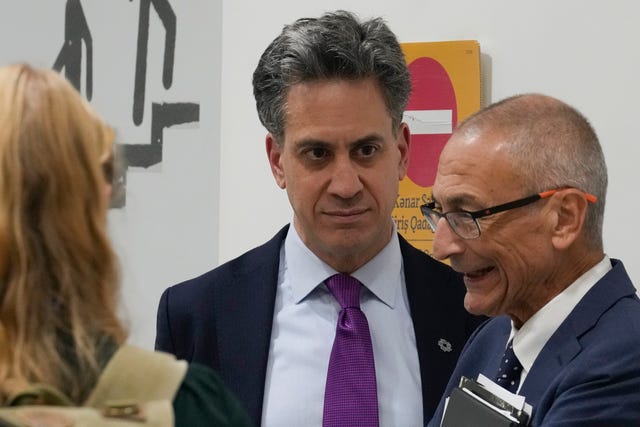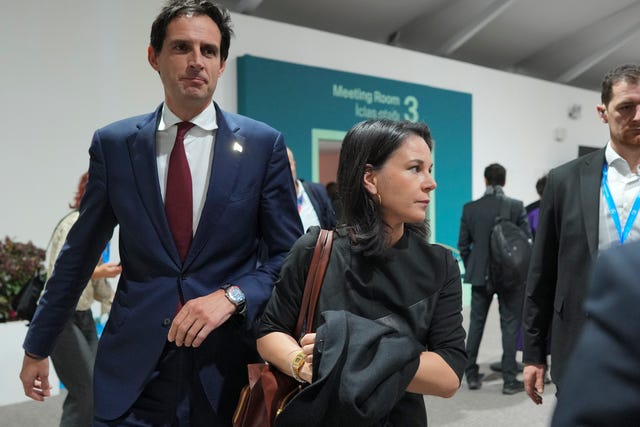Negotiators will soon decide whether to accept a proposed 300 billion dollar package for poorer nations to curb and adapt to climate change — a plan hammered out early on Sunday by the head of fractured United Nations climate talks.
The deal to be presented to nations of “at least 300 billion dollars by 2035” is a compromise between the 1.3 trillion a year developing countries seek to adapt to climate change and wean off fossil fuels and the current 100 billion amount.
Evans Njewa, the chairman of the Least Developed Countries negotiating bloc of nearly 50 countries, would not comment specifically on the latest figure but said “it’s a good value and we hope we can do better”.
The latest figure appears to be something that Fiji can live with, its delegation chief Biman Prasad told The Associated Press.
“Everybody is committed to having an agreement,” Mr Prasad said. “They are not necessarily happy about everything, but the bottom line is everybody wants a good agreement.”

But not everyone was happy.
“The global North has abandoned the global South,” Avantika Goswami of New Delhi-based Centre for Science and Environment said. “This was the last remaining window for the North to step up, pay its fair share, and restore some semblance of trust in the multilateral process. They have failed,” Ms Goswami said.
Mohamed Adow, of the think tank Power Shift Africa, said the summit “has been a disaster for the developing world”.
“It’s a betrayal of both people and planet, by wealthy countries who claim to take climate change seriously,” he said.
Panama’s Juan Carlos Monterrey called it “unacceptable” in a post on X, saying “the text is detrimental to our future and the qualified goal is still very low.”
Earlier on Saturday, negotiators went from one big room where everyone tried to hash out a deal together into several separate huddles of upset nations.
Hallway talk oscillated between hope for shuttle diplomacy to bridge the gap and kicking the can down the road to some time next year. Negotiators and analysts had mostly given up hope that the host presidency would get the job done.
After an initial proposal of 250 billion dollars a year was soundly rejected on Friday, the Azerbaijan presidency brewed up a new rough draft of 300 billion dollars that was never formally presented but also dismissed by African nations and small island states, according to messages relayed from inside.

Asked if the walkout was a protest, Colombia environment minister Susana Mohamed told The Associated Press: “I would call this dissatisfaction, (we are) highly dissatisfied.”
The last official draft on Friday pledged 250 billion dollars annually by 2035, more than double the previous goal of 100 billion dollars set 15 years ago but far short of the annual one trillion-plus dollars that experts say is needed.
Developing countries have accused the richer nations of trying to get their way – and a small financial aid package – via a war of attrition.
Meanwhile, small island nations, particularly vulnerable to climate change’s worsening effects, accused the host country presidency of ignoring them for the entire two weeks.
Panama chief negotiator Mr Monterrey said: “Every minute that passes we are going to just keep getting weaker and weaker and weaker.
“They don’t have that issue. They have massive delegations,” Mr Gomez said, as he watched a delegation of about 20 people from the EU enter the room after shortly after one of his own colleagues left.
“This is what they always do. They break us at the last minute. You know, they push it and push it and push it until our negotiators leave. Until we’re tired, until we’re delusional from not eating, from not sleeping.”
With ministers and delegations from developing nations having to catch flights home, desperation has set in, said Mohamed Adow of Power Shift Africa .
“The risk is if developing countries don’t hold the line, they will likely be forced to compromise and accept a goal that doesn’t add up to get the job done,” he said.
Cedric Schuster, the Samoan chairman of the Alliance of Small Island States issued a statement saying they “were not part of the discussion that gave rise to these imbalanced texts” and asked the Cop29 presidency to listen to them.
Wealthy nations are obligated to help vulnerable countries under an agreement reached at these talks in Paris in 2015.
Developing nations are seeking 1.3 trillion dollars to help adapt to droughts, floods, rising seas and extreme heat, pay for losses and damages caused by extreme weather, and transition their energy systems away from planet-warming fossil fuels and towards clean energy.
Mr Gomez said even the increased 300 billion dollar figure is “still crumbs”.
“How do you go from the request of 1.3 trillion dollars to 300 billion dollars? I mean, is that even half of what we put forth?” he asked.
On Saturday morning, Irish environment minister Eamon Ryan said there will likely be a new number for climate finance in the next draft, adding: “But it’s not just that number – it’s how do you get to 1.3 trillion dollars?”
Mr Ryan said any number reached at the summit will have to be supplemented with other sources of finance, for example through a market for carbon emissions where polluters would pay to offset the carbon they produce.
Teresa Anderson, the global lead on climate justice at Action Aid, said that in order to get a deal, “the presidency has to put something far better on the table”.

“And if they don’t, then LDCs (Least Developed Countries) are unlikely to find that there’s anything here for them.”
Alden Meyer of the climate think tank E3G said it is still up in the air whether a deal on finance will come out of Baku at all.
“It is still not out of the question that there could be an inability to close the gap on the finance issue,” he said. “That obviously is not an ideal scenario.”
Jiwoh Emmanuel Abdulai, the Sierra-Leone environment minister, echoed that sentiment, saying “a bad deal may be worse than no deal for us”.






